Got contracts to review? While you're here for policies, let Cobrief make contract review effortless—start your free review now.

Customize this template for free
Drug testing policy (West Virginia)
In West Virginia, a drug testing policy outlines guidelines for conducting drug and alcohol tests in the workplace to promote safety, productivity, and compliance with state and federal laws. This policy provides clarity on the circumstances for testing, employee rights, and the consequences of violations while safeguarding privacy and ensuring fairness.
The policy establishes the purpose of drug testing, testing methods, and procedures for handling test results.
How to use this drug testing policy (West Virginia)
- Define the purpose: Clearly state the reasons for implementing a drug testing policy, such as ensuring workplace safety, preventing accidents, or complying with industry-specific regulations.
- Specify testing types: Outline the types of testing conducted, such as pre-employment, random, post-incident, or reasonable suspicion testing.
- Explain the testing process: Provide details on how tests will be administered, the substances being tested for, and how results will be handled.
- Address confidentiality: Establish guidelines for maintaining employee privacy and securely storing test results.
- Support compliance: Ensure the policy aligns with West Virginia state laws, federal regulations, and industry standards to avoid legal challenges.
Benefits of using a drug testing policy (West Virginia)
- Enhances workplace safety: Reduces the risk of accidents and injuries caused by impaired employees.
- Supports compliance: Supports adherence to West Virginia labor laws, federal regulations, and industry-specific testing requirements.
- Protects privacy: Provides clear guidelines for handling test results and maintaining confidentiality.
- Promotes productivity: Deters substance abuse, ensuring a more focused and efficient workforce.
- Reduces legal risks: Establishes a fair and consistent framework for drug testing, minimizing the risk of disputes or claims.
Tips for using a drug testing policy (West Virginia)
- Communicate the policy: Share the policy with employees during onboarding and ensure they understand their rights and responsibilities.
- Train managers: Provide training to supervisors on recognizing signs of impairment and implementing testing procedures.
- Use certified testing facilities: Partner with reputable labs to ensure accurate and legally defensible results.
- Maintain transparency: Clearly communicate the circumstances under which testing will occur and the consequences of violations.
- Review regularly: Update the policy as needed to reflect changes in West Virginia laws, federal regulations, or workplace practices.